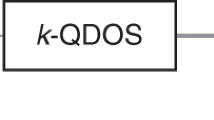Abstract
In recent years, combinatorial optimization has been widely studied. The existing optimization solutions are prone to fall into local optimal solutions and have a lower probability of obtaining global optimal solutions. Quantum approximate optimization algorithm (QAOA) is an effective algorithm that can obtain the optimal solution with high probability. In this paper, the problem Hamiltonian is obtained by summing the problem function and the deformed constraints. Through theoretical formula derivation, the problem Hamiltonian is transformed into the Ising model. The performance of the experimental result under different optimizers and asynchronous lengths is verified on pyQPanda. The experimental results show that when using the problem Hamiltonian method set in this paper, the probability of obtaining the optimal solution is 99.59%. Compared with other methods, the proposed method can alleviate the risk of falling into local optimal solutions and obtain the global optimal solution with a higher probability.

















Similar content being viewed by others
References
Gomoyunov MI, Lukoyanov NY, Plaksin AR (2020) Path-dependent Hamilton–Jacobi equations: the minimax solutions revised
Mmk A, Np B, Skm A (2021) Solving traveling salesman problem using hybridization of rider optimization and spotted hyena optimization algorithm. Expert Syst Appl 183:115353
Liu X, Suo J, Leung S, Liu J, Zeng X (2015) The power of time-free tissue p systems: attacking np-complete problems. Neurocomputing 159(1):151–156
Yetkin M, Bilginer O (2020) On the application of nature-inspired grey wolf optimizer algorithm in geodesy. J Geodetic Sci 10(1):48–52
Wecker D, Hastings MB, Troyer M (2016) Training a quantum optimizer. Phys Rev A 94(2):022309
Verdon G, Broughton M, Biamonte J (2017) A quantum algorithm to train neural networks using low-depth circuits
Boukhtouta A, Ray S, Soeanu A, Pall R, Berger J (2019) Optimization of dnd multi-depot split-load pickup-delivery problem. MATEC Web Conf 296:02009
Zhang L, Liao W (2020) Interactively solving the takeout delivery problem based on customer satisfaction and operation cost. In: HCI International 2020—posters
Ding J, Sun G (2020) Research on the optimization of the instant delivery problem within a city under the new retail environment. In: The 32nd China control and decision conference
Xue G, Wang Z, Wang G (2021) Optimization of rider scheduling for a food delivery service in o2o business. J Adv Transp 2021(3):1–15
Farhi E, Goldstone J, Gutmann S (2014) A quantum approximate optimization algorithm. Eprint Arxiv
Jain A, Nandakumar K, Ross A (2013) Score normalization in multimodal biometric systems. Pattern Recogn 38(12):2270–2285
Forsström MP (2020) Color representations of ising models. arXiv
Breeze B, Jollymore G (2017) Understanding solicitation: beyond the binary variable of being asked or not being asked. Int J Nonprofit Voluntary Sector Market 22(4):e1607
Aharonov D, Dam WV, Kempe J, Landau Z, Regev O (2004) Adiabatic quantum computation is equivalent to standard quantum computation. In: 45th annual IEEE symposium on foundations of computer science
Choi J, Oh S, Kim J (2020) Quantum approximation for wireless scheduling
Papageorgiou A, Petras I (2014) Estimating the ground state energy of the Schrdinger equation for convex potentials. J Complex 30(4):469–494
Slater P.B. (2009) Ratios of maximal concurrence-parameterized separability functions, and generalized peres-horodecki conditions. Quantum Phys (5)
Matos G, Johri S, Papi Z (2020) Quantifying the efficiency of state preparation via quantum variational eigensolvers
Tao X, Wang J, Liao X (2007) An improved particle swarm optimizer with momentum. In: IEEE Congress on evolutionary computation
Khan ME, Liu Z, Tangkaratt V, Gal Y (2017) Vprop: variational inference using rmsprop
Duchi J, Hazan E, Singer Y (2011) Adaptive subgradient methods for online learning and stochastic optimization, pp 257–269
Cui GX, Dian-Kui LI (2018) Research on handwritten digit recognition based on adam optimizer self-encoding
Acknowledgements
This work was funded in part by the Liaoning Provincial Department of Education Research under Grant LJKZ0208, in part by the Scientific Research Foundation for Advanced Talents from Shenyang Aerospace University under Grant 18YB06, and National Basic Research Program of China under Grant JCKY2018410C004.
Author information
Authors and Affiliations
Corresponding author
Additional information
Publisher's Note
Springer Nature remains neutral with regard to jurisdictional claims in published maps and institutional affiliations.
Rights and permissions
About this article
Cite this article
Gong, C., Wang, T., He, W. et al. A quantum approximate optimization algorithm for solving Hamilton path problem. J Supercomput 78, 15381–15403 (2022). https://doi.org/10.1007/s11227-022-04462-y
Accepted:
Published:
Issue Date:
DOI: https://doi.org/10.1007/s11227-022-04462-y




